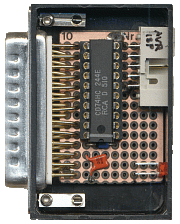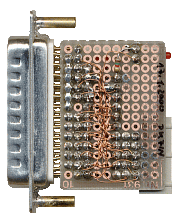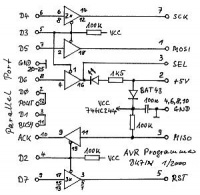Difference between revisions of "Microcontroller DK7IN"
Onnowpurbo (talk | contribs) (New page: Sumber: http://www.qsl.net/dk7in/uC_e.html The gap between TTL graves and the PC can be perfectly filled with modern microcontrollers. They not only contain the CPU but also program and d...) |
Onnowpurbo (talk | contribs) |
||
| (One intermediate revision by the same user not shown) | |||
| Line 39: | Line 39: | ||
* http://www.microchip.com/Download/Lit/PICmicro/16F8X/30430c.pdf | * http://www.microchip.com/Download/Lit/PICmicro/16F8X/30430c.pdf | ||
| + | |||
| + | ==Pranala Menarik== | ||
| + | |||
| + | * [[Microcontroller]] | ||
Latest revision as of 06:02, 17 January 2010
Sumber: http://www.qsl.net/dk7in/uC_e.html
The gap between TTL graves and the PC can be perfectly filled with modern microcontrollers. They not only contain the CPU but also program and data memory, EEPROM, I/O ports, timers, some even ADC and UART. With that you have a complete little computer system on one chip. Advantageous is the low power consumption and the small amount of space needed. Modern chips have a flash program memory so they could be programmed directly in the target system without any efforts.
I started with a MicroChip PIC16F84 until the 1k program memory and the data memory became too small. Now I'm working with the Atmel AT90S4433, which has 4k program, 256B data and 128B EEPROM memory. A/D Converter and UART are already built in.
Here a few links for software and hardware in context with microcontrollers.
AVR
Assembler: AVA assembler from Uros Platise tavrasm GNU/Linux Atmel AVR assembler from Tom Mortensen avra 0.4 AVR assembler from Jon Anders Haugum
Programmer: UISP programmer from Uros Platise PonyProg from Claudio Lanconelli
AVR programmer hardware for the parallel port (after Claudio Lanconelli, avrisp.gif)
With SEL, if neccessary, the signals of the target system could be switched to the programmer.
From the same source a programmer for the serial PC interface seems to be interesting. It can be used for a lot of different chips with the PonyProg software.
PIC
Assembler: gpasm
Programmer: picprog
Simulator: gpsim
more to follow...


